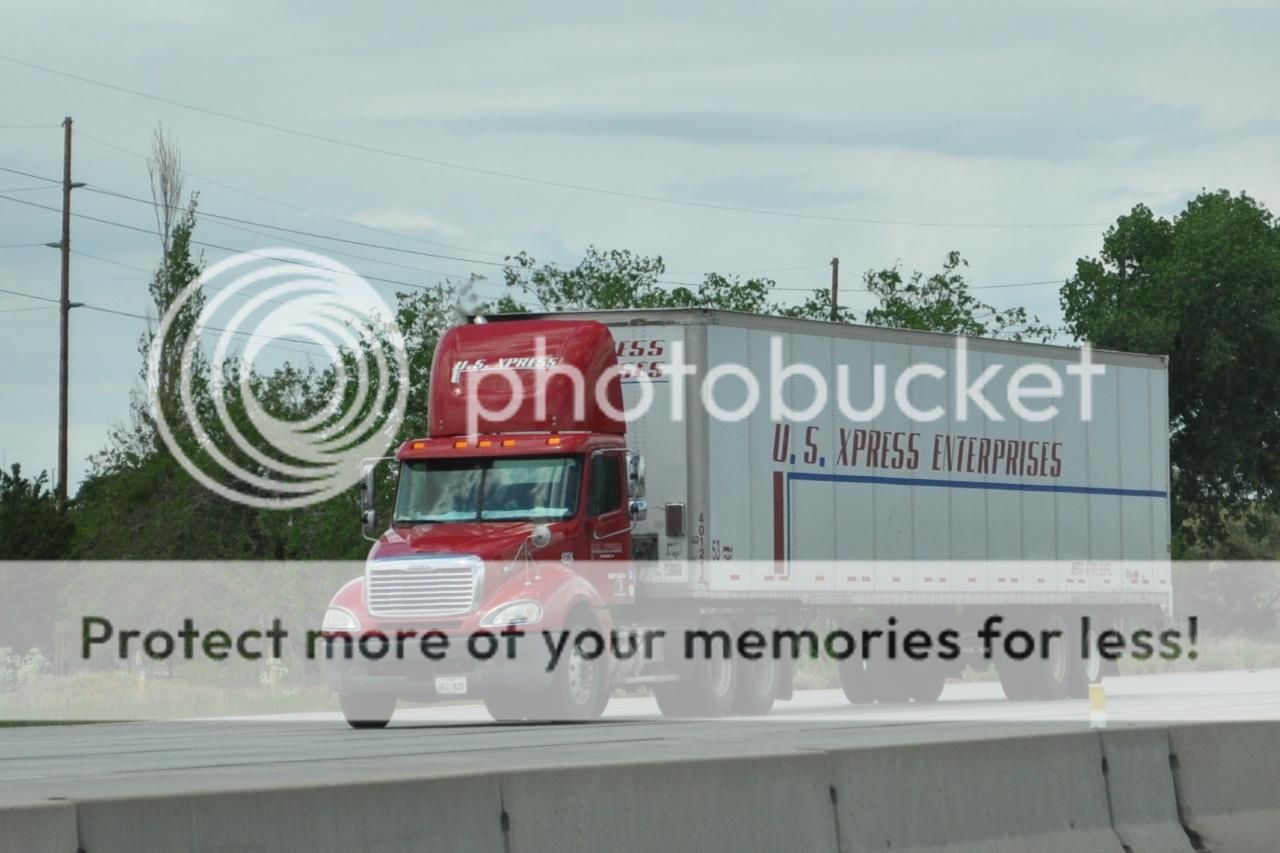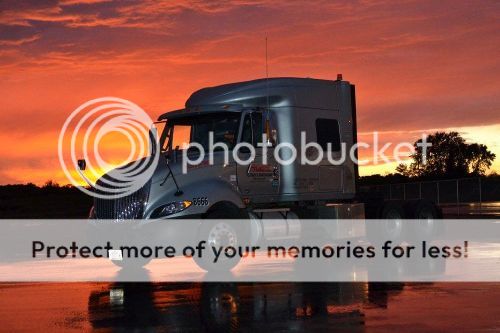Refrigerated Vs. Van
Topic 1312 | Page 1

Just from what I've read on here it seems not much difference other than another thing to look after (the Reefer unit). It can malfunction, you have to fuel it, etc. Also the loading/unloading sometimes takes hours. If you are doing Reefer make sure you ask about detention pay.
I drive a Tanker for Schneider and when I get to a consignee and unload, the first 2 hours are "free" but anything over 2 hours I get paid by the hour in 15 minute increments. I had a load take 5 hours to unload last week because the product was very thick and consignee's personnel were having some sort of meeting when I arrived. So I got paid for the extra 3 hours I spent there.
Consignee:
The customer the freight is being delivered to. Also referred to as "the receiver". The shipper is the customer that is shipping the goods, the consignee is the customer receiving the goods.
Reefer:
A refrigerated trailer.

What do you think the advantages/disadvantages are when selecting what you will haul?
Roehl:
New drivers get 32 cents per mile
add 1 cent for OTR drivers add 1 cent for refrigerated van add 2 cents for flatbed
3 months 2 cent raise 6 months 2 cent raise
Are there any disadvantages driving a Refrigerated Van over Van? I know with Refrigerated you can haul both refrigerated and dry loads but are there any other disadvantages, besides I guess the obvious cooling unit failure. :P
Six
You just answered the question I had for my recruiter this morning. I was wondering what Flatbed started at. Thanks for the post!!
OTR:
Over The Road
OTR driving normally means you'll be hauling freight to various customers throughout your company's hauling region. It often entails being gone from home for two to three weeks at a time.

Another newbie here, and just what I've read to date, but what appealed to me for reefers was that they tend to have longer runs. A lot of food is grown in California, but needs to be shipped country wide. And like TTM mentioned, with reefers, there can be wait times waiting to get loaded / unloaded.
As far as dry vans go, from what I've read, you tend to get more home time, and the loads tend to be more drop and hook. I don't want to get in trouble here, using the wrong terminology, but I think dry vans will be more 'regional' in nature. I was looking at Swift, which is a big dry van company, and they run 'zones' SE is a zone, NE is a zone, mid country is a zone etc, and they try to run you in a zone near your home. Now, you won't be home on the weekends like a regional , but you will get better home time than with refrigerated.
Or so I've read.
Regional:
Regional Route
Usually refers to a driver hauling freight within one particular region of the country. You might be in the "Southeast Regional Division" or "Midwest Regional". Regional route drivers often get home on the weekends which is one of the main appeals for this type of route.
Dry Van:
A trailer or truck that that requires no special attention, such as refrigeration, that hauls regular palletted, boxed, or floor-loaded freight. The most common type of trailer in trucking.Reefer:
A refrigerated trailer.
Drop And Hook:
Drop and hook means the driver will drop one trailer and hook to another one.
In order to speed up the pickup and delivery process a driver may be instructed to drop their empty trailer and hook to one that is already loaded, or drop their loaded trailer and hook to one that is already empty. That way the driver will not have to wait for a trailer to be loaded or unloaded.

With Roehl I'll get 3 days off per 11-14 days out. If you choose to stay out longer it just adds to your home time so If I stay out 11 days and decide to do anotehr 11 I'll get 6 days home when I get back. I was planning on dry van but the company really needed refrig dirvers more so I'm being flexable with their needs.. and every axtra cent per mile doesn't hurt either.
six
Dry Van:
A trailer or truck that that requires no special attention, such as refrigeration, that hauls regular palletted, boxed, or floor-loaded freight. The most common type of trailer in trucking.OOS:
When a violation by either a driver or company is confirmed, an out-of-service order removes either the driver or the vehicle from the roadway until the violation is corrected.

Yea, that's pretty standard for home time.... with Prime they advertise 1 day home for each 4 days OTR , and Swift was 1-6 I think ...
Now, does Roehl offer CDL training? I thought you had to have a CDL-A in hand before they took you on into there school, which was for finishing, right?
I've looked at so many programs, they start to run together...lol. I had to build a matrix in Numbers (apple database program) to keep track of all the differences.
I really liked Roehl, they have some excellent home time programs after you've been there awhile... 7/7 and 7/14 if home time is important to you.
I sent emails and made phone calls but could never get anybody to give me an answer to their training. If I recall, Wisconsin, get there yourself, pay own lodging, and pay upfront for schooling (loan) is that about right?
They have a big focus on safety, if its the company I was thinking about. They were actually very high on my list, but despite all my efforts (and I can be creative) I never could get ahold of anybody.
I would love to read about your experiences.
CDL:
Commercial Driver's License (CDL)
A CDL is required to drive any of the following vehicles:
- Any combination of vehicles with a gross combined weight rating (GCWR) of 26,001 or more pounds, providing the gross vehicle weight rating (GVWR) of the vehicle being towed is in excess of 10,000 pounds.
- Any single vehicle with a GVWR of 26,001 or more pounds, or any such vehicle towing another not in excess of 10,000 pounds.
- Any vehicle, regardless of size, designed to transport 16 or more persons, including the driver.
- Any vehicle required by federal regulations to be placarded while transporting hazardous materials.
OTR:
Over The Road
OTR driving normally means you'll be hauling freight to various customers throughout your company's hauling region. It often entails being gone from home for two to three weeks at a time.

Yes, they have their own training in WI. You have to have your CDL permit before school, not the full blown license but the training permit. They also have financing for the cost if your credit score is 500 or higher. Below is the e-mail of my recruiter:
kimberly.calhoun@roehl.net
Six
CDL:
Commercial Driver's License (CDL)
A CDL is required to drive any of the following vehicles:
- Any combination of vehicles with a gross combined weight rating (GCWR) of 26,001 or more pounds, providing the gross vehicle weight rating (GVWR) of the vehicle being towed is in excess of 10,000 pounds.
- Any single vehicle with a GVWR of 26,001 or more pounds, or any such vehicle towing another not in excess of 10,000 pounds.
- Any vehicle, regardless of size, designed to transport 16 or more persons, including the driver.
- Any vehicle required by federal regulations to be placarded while transporting hazardous materials.

Just from what I've read on here it seems not much difference other than another thing to look after (the Reefer unit). It can malfunction, you have to fuel it, etc. Also the loading/unloading sometimes takes hours. If you are doing Reefer make sure you ask about detention pay.
I drive a Tanker for Schneider and when I get to a consignee and unload, the first 2 hours are "free" but anything over 2 hours I get paid by the hour in 15 minute increments. I had a load take 5 hours to unload last week because the product was very thick and consignee's personnel were having some sort of meeting when I arrived. So I got paid for the extra 3 hours I spent there.
Just got the answer from Roehl.
More and more refrigerated freight is becoming drop and hook. Detention is available after 2 hours and then is paid $10 an hour in ½ hour increments.
Consignee:
The customer the freight is being delivered to. Also referred to as "the receiver". The shipper is the customer that is shipping the goods, the consignee is the customer receiving the goods.
Reefer:
A refrigerated trailer.
Drop And Hook:
Drop and hook means the driver will drop one trailer and hook to another one.
In order to speed up the pickup and delivery process a driver may be instructed to drop their empty trailer and hook to one that is already loaded, or drop their loaded trailer and hook to one that is already empty. That way the driver will not have to wait for a trailer to be loaded or unloaded.
We have a series of articles on How To Choose A Truck Driving Job. If you scroll down the page a bit you'll see an 8 part series I wrote and it covers the different types of freight you can haul, different size companies, and things like that. Read through those articles and you'll get a great idea of the differences between hauling the various types of freight.
HOS:
Hours Of Service
HOS refers to the logbook hours of service regulations.OOS:
When a violation by either a driver or company is confirmed, an out-of-service order removes either the driver or the vehicle from the roadway until the violation is corrected.

Yes, they have their own training in WI. You have to have your CDL permit before school, not the full blown license but the training permit. They also have financing for the cost if your credit score is 500 or higher. Below is the e-mail of my recruiter:
kimberly.calhoun@roehl.net
Six
My Roehl recruiter told me I would have to have my CDL-A before being accepted. She gave me the name of their preferred school here in AZ. After that I would be invited to their orientation, all expenses paid. I'm not sure what their criteria is to attend their CDL training, but apparently you have to live in certain states.
CDL:
Commercial Driver's License (CDL)
A CDL is required to drive any of the following vehicles:
- Any combination of vehicles with a gross combined weight rating (GCWR) of 26,001 or more pounds, providing the gross vehicle weight rating (GVWR) of the vehicle being towed is in excess of 10,000 pounds.
- Any single vehicle with a GVWR of 26,001 or more pounds, or any such vehicle towing another not in excess of 10,000 pounds.
- Any vehicle, regardless of size, designed to transport 16 or more persons, including the driver.
- Any vehicle required by federal regulations to be placarded while transporting hazardous materials.
New Reply:
New! Check out our help videos for a better understanding of our forum features

















Preview:








 TT On Facebook
TT On Facebook
What do you think the advantages/disadvantages are when selecting what you will haul?
Roehl:
New drivers get 32 cents per mile
add 1 cent for OTR drivers add 1 cent for refrigerated van add 2 cents for flatbed
3 months 2 cent raise 6 months 2 cent raise
Are there any disadvantages driving a Refrigerated Van over Van? I know with Refrigerated you can haul both refrigerated and dry loads but are there any other disadvantages, besides I guess the obvious cooling unit failure. :P
Six
OTR:
Over The Road
OTR driving normally means you'll be hauling freight to various customers throughout your company's hauling region. It often entails being gone from home for two to three weeks at a time.